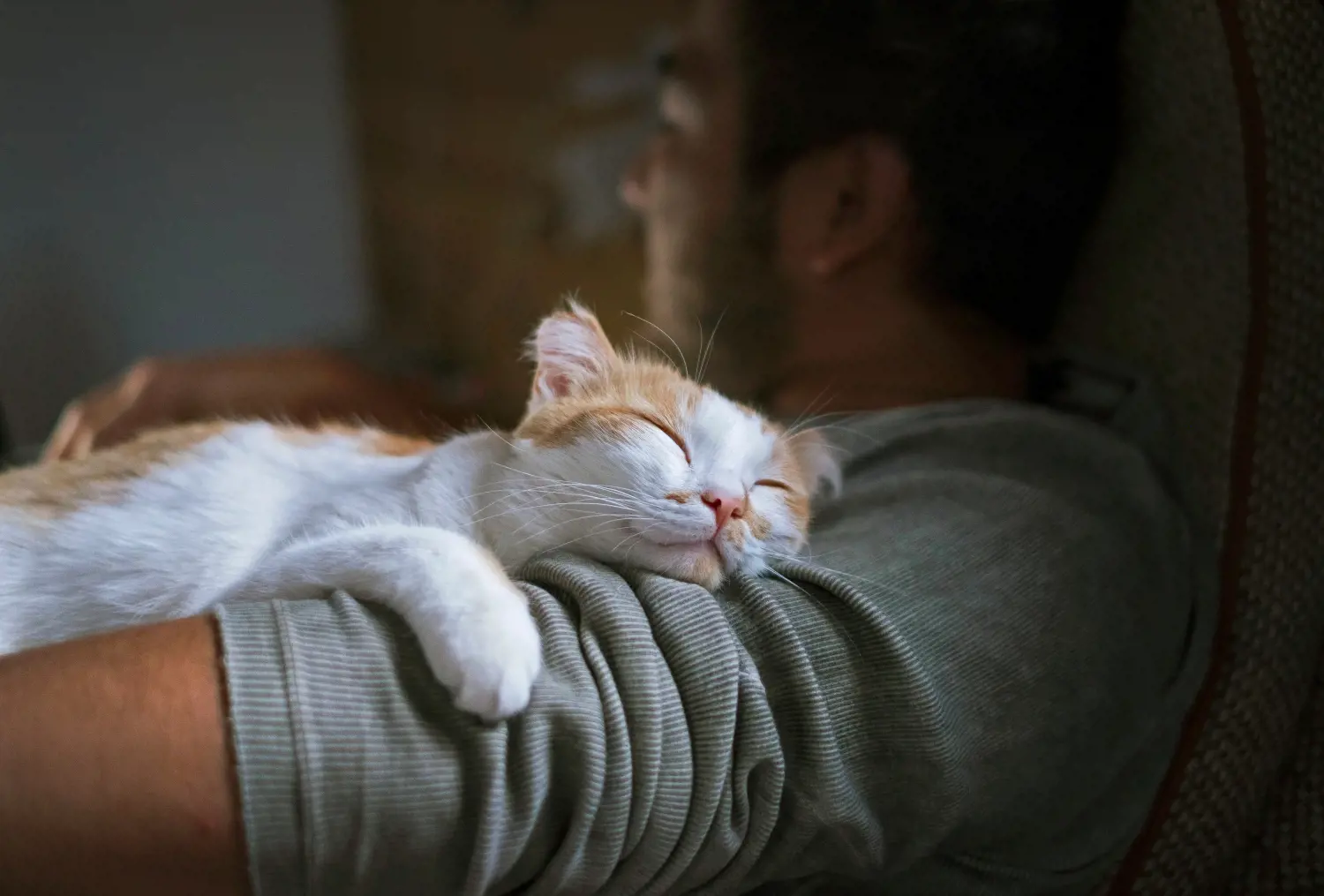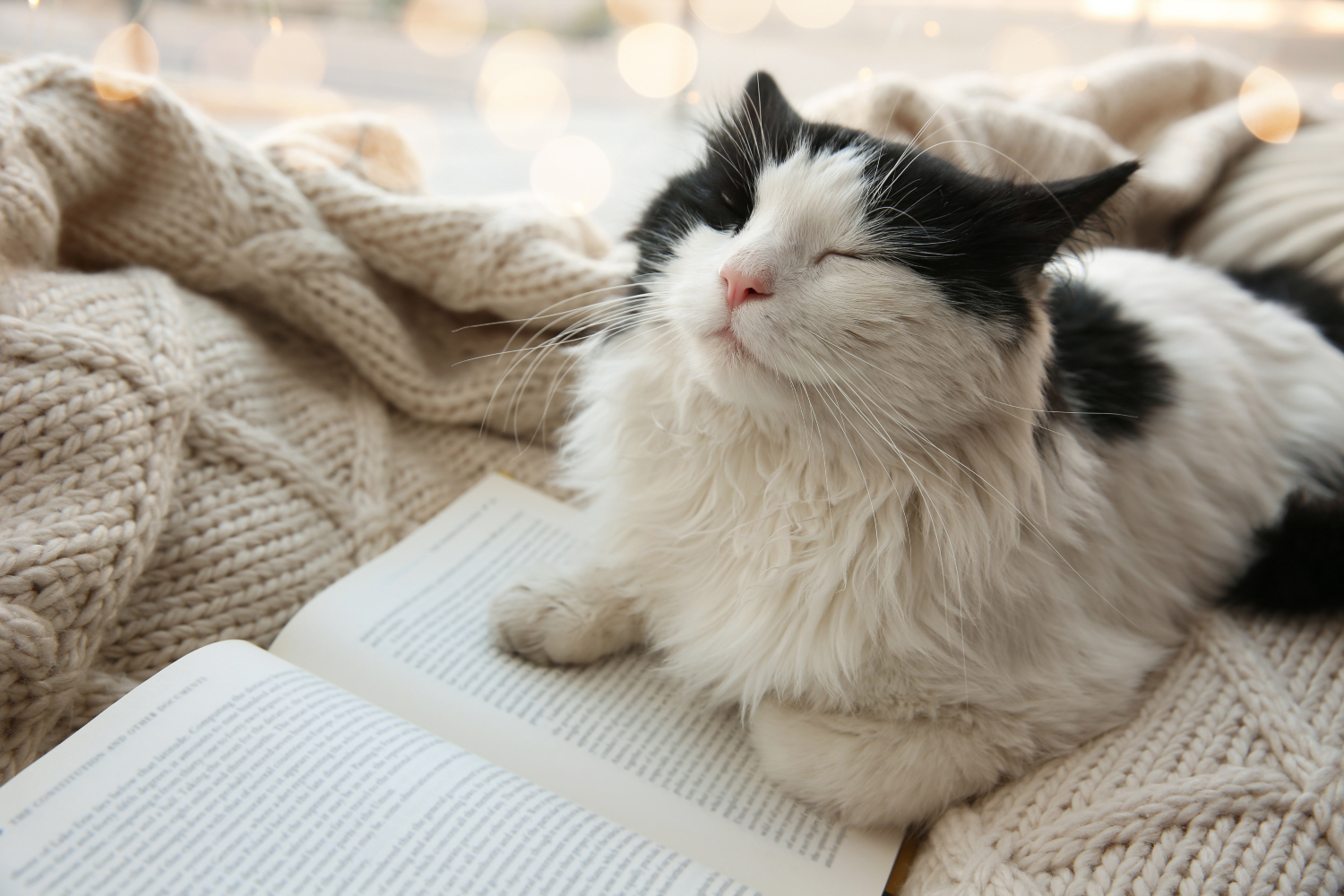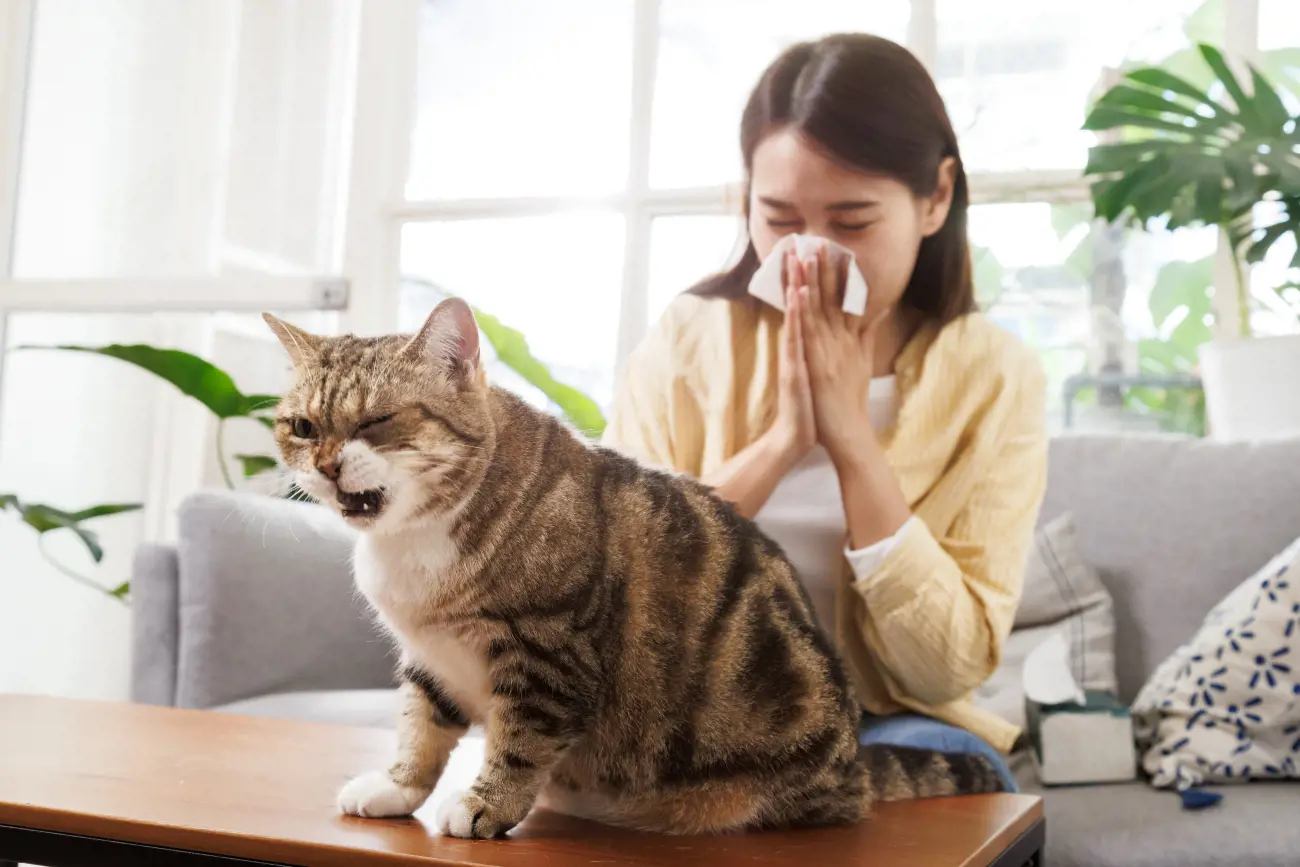Why did my cat stop purring? Is this a problem?
20th December, 2022

Has your ‘purrrfect’ cat suddenly gone silent? Don’t worry! Find out why your cat purrs, what it means if they stop, and what you can do to help.
Is there any sound more soothing than the peaceful purring of a cute cat? We don’t think so!
The calming vibrations are enough to make any pet parent as happy and content as their kitty. It might even send you into a deep slumber yourself! But who doesn’t love an afternoon cap nap, right?
Your feisty feline might have been hypnotising you with its magic murmurs since it was a kitten, but something seems a little ‘off’ recently – they’ve stopped purring, and that’s enough to worry any loving owner.
Fear not! In this blog we’ll reveal why your cat makes this soothing sound and what it means if they suddenly stop.
We also take a look at whether it’s possible to purr too much and some other ways your feline communicates with you – after all, the more you understand them, the better you can protect your pet.
We care about your cat as much as you do! That’s why we work hard to provide cat insurance quotes to find them the protection they deserve.
What is cat purring?
Soft, rumbling, calming vibrations. The comforting purr from your moggy reassures you that you’re stroking them in all the right places and they’re living their best life! But how do they make such a unique sound?
There’s been an everlasting debate in the science world as to how your sweet kitten musters up this noise, but (most) experts now agree on the same theory.
Your moggy’s magical purr likely comes from its larynx – specifically the part that surrounds their vocal cords called the glottis.
As your cat moves, the glottis constricts and dilates, causing the air to vibrate with every breath and create that pleasing purr.
Quick fact: Did you know that lions can’t purr, but other big cats can, like cheetahs, snow leopards, and lynxes? Not that we’d want any of those to hop up onto our laps!
Why do cats purr?
When your feline friend is happy and content, they purr, don’t they? Sometimes, yes, but sometimes it’s for other reasons.
It all begins when your tiny kitten is just a few days old and is still blind and deaf. Purring lets their mum know where they are and that they need feeding, a little like a human baby makes noises when it’s hungry.
This endearing behaviour doesn’t stop with age, though. You may well be familiar with your adult mog purring and rubbing against your leg when it’s time for dinner.
Why do we associate pleasure with purring then?
Some cats love a good stroke (although others, not so much). Purring is usually their way of telling you, “I’m completely happy and loving life!”
Is it ever a sign something’s wrong?
Well, it can be. While we’d all love to believe our purring friends are doing so because they are filled with happiness, it isn’t always the case.
Purring may be beneficial to pets in pain by releasing endorphins that could provide relief. It works in a similar way to alleviate stress and calm your cat.
So, how can you tell your feline is happy or in pain?
Keep an eye on their general behaviour to spot when something’s up. Learning to read your cat’s body language is an excellent way to build your bond, and the more you get to know them, the better you’ll be at knowing when they’re poorly.
Need some tips on what to look for? We’ve got plenty of help in our cat body language guide.
Contact the Purely Pets team for cat insurance quotes today and arm your feline with pet insurance in case you need to rush them to the vets.
Is a cat purr beneficial to humans?
Curling up with your cuddly cat is one of the best feelings in the world – like a soothing massage for your soul. But can a pleasing purr really turn your Blue Monday into one that’s stress-free and full of happiness? Possibly!
According to Cats Protection, it could be the purr-fect remedy for stress and provide a boost to your wellbeing. And that’s not all it might be good for!
A lazy afternoon in front of the TV with your purring puss may be able to:
- Help recover from infection and swelling
- Decrease your risk of a heart attack
- Speed up healing time in bones, muscles, ligaments and tendons
- Improve your mental health
Have you felt the positive vibes emanating from your feline friend? It’s well worth all the snuggle sessions to find out!
4 reasons your cat isn’t purring
So, we’ve established what purring is, why your cat does it, and how it can even be beneficial to you as their pet parent. It makes us love them just a little bit more!
But wait. You just settled in for a stroke sesh and they aren’t making a sound! Come to think of it, they didn’t purr before dinner either! What’s happening?
Don’t worry. Whether it’s a sign they want some time alone or a discreet way of telling you about an underlying health issue, we’re here to help.
Let’s take a closer look at a few reasons why your cat has given up on its purr.
1. They feel satisfied
If your kitty is still purring when they want a stroke or some food but soon stops when they get what they want, it might just mean they’re silently content. And there’s nothing wrong with that.
You can expect the sound to soon start up again when your faithful feline is in the mood for another snack or petting session. If they don’t? It might be something else below.
2. They want some ‘me’ time
Remember we mentioned that not every puss is fond of petting? If you begin to stroke them and they go silent, it could mean that they aren’t a fan of being handled – sorry!
However much you might be yearning to for a cuddle and to hear that heart-warming murmur, your pet might just want to be left alone.
If you have a non-purrer in your household, let them come to you for attention rather than picking them up and plopping them on your lap.
3. They are stressed or anxious
Hang on a minute – didn’t you just say they purr to help with these? Yes, we did, but it can also cause them to stop purring.
Cats get easily distressed, especially when something messes up their routine. Anything from moving home to buying a new sofa could wreak havoc on your pet, and delicate felines need time to adapt.
Just like us, every animal is unique and they handle situations differently. This could mean whaling the house down with meowing for some, whereas others prefer to give you the silent treatment and stop purring.
Get your mog to the vet if you think they might be feeling a little down in the dumps to see what you can do to help.
With pet insurance from Purely Pets, you can have a 24/7 video chat with a veterinary professional to get some expert advice. Not got your kitty covered yet? Get in touch for cat insurance quotes today.
4. They are ill or injured
Thanks to their African Wildcat roots, cats prefer to hide any signs of vulnerability that might otherwise mean they become another animal’s dinner in the wild.
Your cat would much rather seek solitude somewhere quiet in your home and wait for the pain to pass than ask you for help. It’s tough to think about, but it’s true!
Cats purr to self-soothe their symptoms, which they might also see as showing signs of weakness. So, in an attempt to mask their pain and discomfort from you, they stop purring.
Now you can see why it’s always worth a quick trip to the vets if your cat has given up purring altogether. It could mean they got injured in a neighbourhood scrap or are feeling under the weather and need your help – despite not asking for it!
Do I need to see a vet?
It depends. Cats who simply stop purring because they want to be alone or when they’re content likely don’t warrant a trip to the vets.
You can tell when it’s something less serious because there will still be times when you hear the delightful purr of your pet.
It’s when they stop making the sound altogether that you need to take action. Whether it’s suffering from an ailment or feeling overly stressed, your cat may need to see a professional.
Worried about paying for care and treatment? Protect your playful cat with pet insurance and we couldhelp cover the costs. Speak to our team and get cat insurance quotes for our 15 levels of lifetime protection to find one that fits your budget and needs.
Do old cats stop purring?

It’s almost impossible for an ageing moggy to stop purring due to age alone. Most cats won’t experience a weakened larynx, so if they have lost their vibrating abilities, it could be because of an accident or illness.
In other cases, cats with dementia could potentially ‘forget’ how to purr. But this is extremely rare.
As felines age, they become more susceptible to medical concerns (don’t we all!), so getting them to the vet as soon as you notice something is up means they’ll have a higher chance of recovering.
Finding it hard to get cat insurance quotes for your older cat? There’s no upper age limit to Purely Pet’s lifetime policies, so contact us to protect your cat today.
Can I teach my cat to purr?
You can’t teach a feline to purr – it’s a natural behaviour they pick up in the first few days of their lives. But you might be able to give them a little encouragement if they seem to be giving you the silent treatment.
If these tricks don’t work, it’s best to double check with your vet:
- Talk to your cat – the higher the pitch the better (think chirping birds and mice, and no, we’re not kidding). They know when you’re speaking to them!
- Pet your feline in all the right places, unless they don’t like to be touched.
- Make your cat happy by providing an inviting environment, complete with high-up hiding spaces, scratching surfaces, and a cosy bed.
- Give your cat plenty of praise with strokes and treats when they do something well.
If none of the above work for your pet, you either have a mega grump on your hands who struggles to express themself or they need a vet to step in and help.
Can a cat purr too much?
For your liking, probably not. You could never get tired of the sweet soothing sounds, and neither could we! And if you do find your murmuring mog making a lot of noise, it’s rarely something to worry about, especially if they’ve always done it.
The only time you might want to get a second opinion is if they’ve developed a new tendency to purr all the time. In this case, it could signal they are in pain and trying to self-soothe.
Vet bills can soon pile up, especially as felines enter their golden years. Get cat insurance quotes from Purely Pets to help financially and protect your moggy throughout their life.
Why is my cat kneading?
You know that adorable back and forth motion your cat makes with its paws to accompany its purring? That’s kneading!
This cute cat habit is another thing that develops early into kittenhood, which they use on their mother’s stomach to increase the milk flow.
So, although kneading your legs might cause the odd squint as those claws start to dig in, you should feel content that your cat is sharing this special moment with you.
It means they’re more than happy in this feline-human relationship and are forming a strong bond like the one they once had with their own mum.
The only downside? The safer and more secure they feel with you, the harder they knead!
What other ways do cats communicate?
Happiness, sadness, depression, anger, fear. Your cat can experience almost as many emotions as you. The thing is, they don’t make it quite as obvious as to how they’re feeling, which can be tough on pet parents everywhere.
Imagine your feline friend suffering from anxiety or in great pain and you being none the wiser. It’s a difficult situation, right?
Luckily, learning to read their body language could unlock the key to a whole new understanding between you and your cat. But how can you tell what signs mean which emotions? Here are a few tips!
Reading your cat’s tail
When we talk about our canine companions, we all know that a wagging tail means they are super happy. The signals aren’t quite as clear in their feline counterparts.
A tall tail with a little curled tip usually means your pet is feeling happy and safe. As they start to feel anxious or frustrated, it might begin swaying slowly from side to side.
Scared mogs will hide it under their tummies or move it quickly from left to right. Ever seen an angry cat? Their tails become stiff or curl up around their body!
Reading your cat’s eyes
Have you ever found yourself looking lovingly into your cat’s eyes? No, we didn’t think so. Felines rarely gaze for long at their pet parents, but that doesn’t mean you shouldn’t be paying close attention to those tiny peepers.
When happy and relaxed, expect your cat’s eyes to be partially or fully closed in contentment, while scared and anxious kitties will open them wide and develop dilated pupils. Angry cats look similar but won’t even blink!
Reading your cat’s ears
The signs are a little more subtle when it comes to ear-reading, but your cat will have ears that point upwards when content.
Ever noticed them flatten to the side of their head? Your cat was probably scared or angry. If they move around quickly, they might be feeling anxious.
Worried your mog is more moody than usual? Jump on a video chat with one of our vets if you’ve got a policy with Purely Pets.
Haven’t found the right cover yet? Speak to our helpful team to get cat insurance quotes to fit your individual circumstances.
Reading your cat’s whiskers
Yep, even your feline’s whiskers can be read! Seriously! When they flatten against your pet’s face, it means they’re scared. Stiff and forward-facing whiskers could be a sign of anger or frustration.
How about a content cat? Their whiskers will look relaxed and sit away from their face. Get your magnifying glass out if you don't believe us!
Reading your cat’s body
As well as looking out for the subtle signs of these individual body parts, you should be watching their body as a whole. Little tip: this is usually the easiest way of telling how they are.
Chilled out cats will be sitting or lying with their paws curled under their tummy or stretched out in full-on relaxed mode.
A feline freezing on the spot or running for cover is a sure sign they’re frightened. And if they go stiff and their fur stands on end? Stay back for now – they aren’t happy at all!
Should I cover my cat with pet insurance?
You do everything in your power to make sure your feisty feline enjoys a highly nutritious diet, plenty of exercise, and lots of mental stimulation to keep them happy and healthy.
But is it enough?
Even the most agile, fit felines can get into an accident or suddenly fall ill, meaning quite a few trips to the vets are in order. Medical bills can soon add up and leave a rather large hole in your pocket – unless you have pet insurance.
Now, the cat insurance quotes you get won’t cover your pet for non-emergency treatments, like vaccinations and neutering, but you can speak to your vet about a pet health plan to spread these costs.
Feline insurance plans are designed to protect your pet in those unexpected situations when your kitty needs urgent care – in the times when they need it most.
Lifetime cover from Purely Pets can take care of the vet bills so your mischievous mog can get back to its old self again.
Get cat insurance quotes for your beloved pet

Are you looking for lifetime protection to support your feline friend? Whether they get themselves into trouble or simply give up purring, we’ve got you covered.
At Purely Pets, we offer 15 levels of cover to choose from – all with access to our 24/7 vet video service for when you need professional advice, fast.
So, what are you waiting for? Contact our team today for cat insurance quotes and give your feline family member the protection they deserve.
Helpful Pages
Recent Posts

Why do Great Danes bury their heads?
12/03/25
Find out more about Beagles
28/02/25Pet Insurance Quote
- 98% claims paid *
- Claims paid directly to vets
- 24/7 vet video consultations
- Interest free monthly payments


